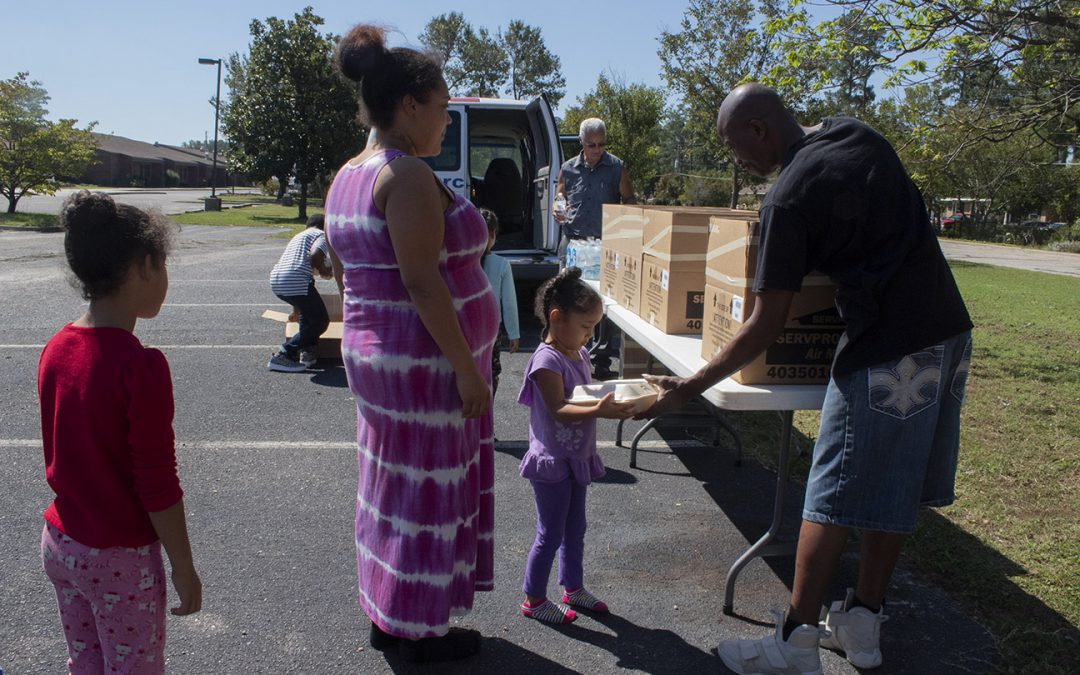LUMBERTON, N.C. — Two years ago, when John Givens was driven from his home by Hurricane Matthew, he went to a shelter and was given plenty of food and clothes to carry him through the crisis. This week, Givens is once again in a shelter due to flooding from Hurricane Florence, but he says he’s surprised by the paucity of food and clothes available.
“People had clothes. We had good food after Matthew. Not this time,” said Givens, who lives in Robeson County, one of the poorest areas of North Carolina. “I have diabetes and today, I was given a cupcake, orange juice and a Pop Tart.”
Due to a stricter enforcement of its donation regulations, the American Red Cross has suggested donating time, money or blood instead of food and clothes because strict regulations on such items may prohibit them.
Givens, who is taking shelter at Lumberton High School, is one of more than 15,000 people who fled to the Red Cross shelters across the Carolinas. At least 14,200 people were in 137 North Carolina shelters, and 819 people in nine South Carolina shelters.
According to their goods donation form, the American Red Cross has several limitations prohibiting community organized collections. The only foods allowed must be in bulk directly from suppliers and transported on pallets.
“During Matthew, we got a lot of in-kind items that showed up at shelters because that’s the best way people knew to help — is to bring items to shelters,” said Red Cross spokeswoman Brittany Jennings. “You may not be seeing that on the ground during our Hurricane Florence response because folks are maybe giving dollars or time or blood. We’ve had two years for folks to process what happened and figure out other ways that they can help.”
According to the Red Cross, the regulations have existed for several years, but after Hurricane Matthew, the humanitarian group decided to strongly push for direct financial donations rather than in-kind contributions.
Lumberton High School was particularly affected, housing 650 people in a room that is meant to hold 450. Several shelter seekers have expressed frustration with the lack of supplies available, including clothes and beds.
Nancy Hunt and her children, residents of Lumberton, had to sleep on the floor due to a lack of cots. They were forced to flee their home within a matter of hours to escape the catastrophic floods that swept away their belongings.
“Do you know what it’s like to hear your children say, ‘I’m hungry’ and you can’t do anything about it?” Hunt said as tears streamed down her face.
The competition for supplies has led people in the Lumberton shelter to steal from others, according to several people, making the environment more stressful and more emotional.
“I wouldn’t wish this on my worst enemies,” Hunt said.
Church members from Zion Hill Baptist Church in Shannon, N.C., traveled to a shelter at St. Paul High School in Lumberton on Wednesday in a truck filled with bags of apples and home-cooked meals made by the NC Baptist Men, also known as Baptists on Mission.
After showing up at the high school, NC Baptist Men volunteers were informed that they were not allowed to go inside of the school with the meals because of the Red Cross’ in-kind donation limitations.
But the church group used shelter parking lots to distribute more than 10,000 meals a day during Florence relief efforts.
Laron Locklear, a deacon at the Shannon church location, criticized the Red Cross’ rules as unnecessary roadblocks to the amount of resources that can be provided to those in need.
“Policies are meant to be broken — we call it an exception,” Locklear said.
The requirements for each shelter vary depending on the population’s needs, making it uncertain whether most in-kind donations are accepted. Monetary donations are the most useful, Jennings said.
“I would recommend that they call a shelter first before they arrive and make sure the shelter’s still open,” Jennings said. “We’re in the middle of a disaster so those are going to be possibly changing as we go throughout this recovery process.”


